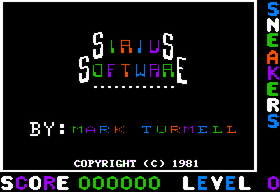- Sirius Software
-
Not to be confused with the current Sirius Software located in Cambridge, Massachusetts, USA, which sells add-on products for the Model 204 database.
Sirius Software was a video game publisher of Apple II, Commodore 64 and Atari computer games in the early 1980s.
Contents
Founding and early history
The company was founded in the early 1980s by Jerry Jewell and Nasir Gebelli.[1] It gained attention for its dramatically quick rise to prominence and its equally quick collapse in 1984 after 20th Century Fox (Fox Video Games) failed to pay over USD$18 Million in owed royalties.[2] Sirius Software designed and marketed more than 160 computer video games, software products and hardware devices worldwide. Jewell was profiled by author Steven Levy in his book Hackers.
Sirius' quick rise was due in part to a chain of hits by programmer Nasir Gebelli.[3] Gebelli's breakthrough game was Gorgon, which brought the gameplay of the arcade's Defender to the Apple II. His creativity and Jewell's sales and marketing skills combined to create in a single year a multi-million dollar enterprise operating out of a rented apartment.[citation needed]
Sirius also published a line of graphical adventure games in an attempt to compete with Sierra On-Line, but without much success.[citation needed] Most of the company's games were launched on the Apple II line of computers, but they also released some titles for other platforms, notably the Atari 400/800 machines and Commodore 64.[4]
Jerry Jewell
Jewell currently runs a children's non-profit organization in Rancho Cordova, California that teaches teens teamwork and leadership skills through challenging performing arts projects.[citation needed] The Jewell Performing Arts Center, Inc. produces "Scary U", the nation's only haunted house school. Scary U won the coveted "Golden Bucky" award in 2004 for the best professional haunted house in the country.[citation needed] Jewell also designs and manufactures professional animatronics for the Halloween industry.[citation needed] He has one child, a daughter, Kathryn.[citation needed]
The Smithsonian Museum produced a "living history" video of Jewell's role in the early personal computer industry.[5]
Games
Arcade-style games
- Both Barrels (1980)
- Cyber Strike (1980)
- Star Cruiser (1980)
- Phantoms Five (1980)
- Autobahn (1981)
- Gorgon (1981)
- Outpost (1981)
- Pulsar II (1981)
- Sneakers (1981)
- Space Eggs (1981)
- Beany Bopper (1982)
- Deadly Duck (1982)
- Fantastic Voyage (1982)
- Fast Eddie (1982)
- Bandits (1982)
- Turmoil (1982)
- Type Attack (1982)
- Worm War I (1982)
- Snake Byte (1982)
- Bandits (1983)
- Flash Gordon (1983)
- Plasmania (1983)
- The Earth Dies Screaming (1983)
- Repton (1983)
- SpaceMaster X-7 (1983)
Adventure games
- Blade of Blackpoole (1982)
- Critical Mass (1982)
- Escape from Rungistan (1982)
- Kabul Spy (1982)
- Gruds in Space (1983)
Strategy games
- Dark Forest (1981)
- Call to Arms (1982)
- Cyclod (1982)
References
- ^ Nasir Gebelli at MobyGames
- ^ S. Levy, Hackers: Heroes of the Computer Revolution, Doubleday, Garden City, 1984
- ^ S. Levy, Hackers: Heroes of the Computer Revolution, Doubleday, Garden City, 1984
- ^ S. Levy, Hackers: Heroes of the Computer Revolution, Doubleday, Garden City, 1984
- ^ Smithsonian Institution Archives
Categories:- Defunct video game companies
- Defunct computer companies of the United States
- Video game companies of the United States
Wikimedia Foundation. 2010.

